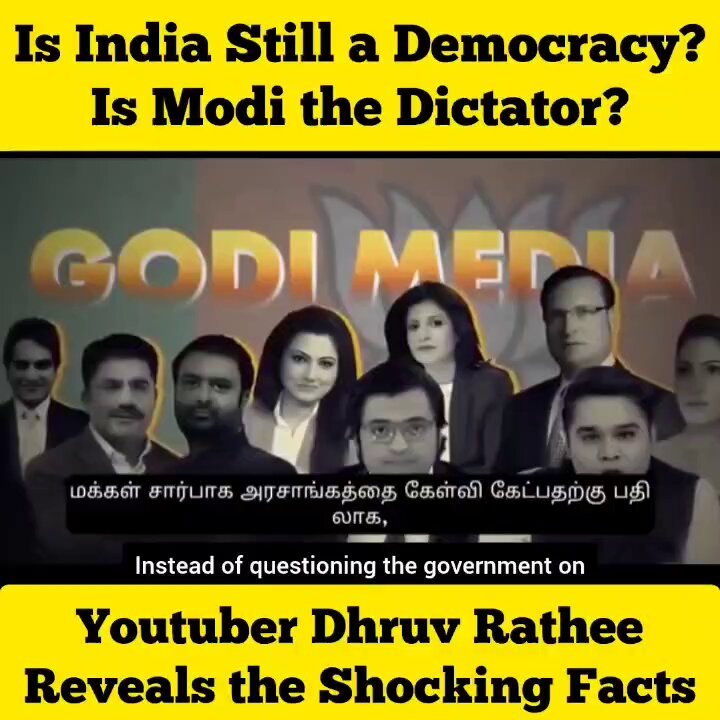Dhruv Rathee is Right
Dhruv Rathee is Right BJP’s Mysterious treason of Republic. In recent times, political converse in India has become decreasingly concentrated, with citizens expressing enterprises over the state of the republic in the country. Among the voices contributing to this discussion is Dhruv Rathee, a prominent YouTuber known for his critical analysis of Indian politics and society. In one of his vids named” Is India getting an Absolutism?”, Rathee delves into the question that has been on the minds of numerous Indians. Let’s anatomize the arguments presented in the videotape and explore whether India is indeed traipsing towards despotism.
Why Dhruv Rathee is Right
Dhruv Rathee is right because he raises several concerns in his video that resonate with a section of the Indian population:
Erosion of Dissent: He highlights instances of alleged media restrictions, government pressure on journalists, and limitations on free speech.
Rise of Hindutva Ideology: He expresses his apprehension about the growing influence of right-wing ideology and its potential impact on India’s secular fabric.
Weakening of Institutions: Rathee voices concerns about the perceived weakening of democratic institutions like the judiciary and the electoral commission.
Misuse of Law Enforcement: He raises questions regarding the alleged use of law enforcement agencies to target political opponents.

Who is Dhruv Rathee ?
Dhruv Rathee, a popular Indian YouTuber known for his social and political commentary, lately sparked a disagreement with his videotape named” Is India getting an Absolutism?” This blog post delves into the crucial arguments presented in the videotape, explores the counterpoints, and analyzes the ongoing debate girding India’s popular future Dhruv Rathee’s woman, Juli Lbr- Rathee, maintains a fairly private life online, making information about her specific background limited.
Dhruv Rathee's Wife
Dhruv Rathee’s wife, Juli Lbr-Rathee, maintains a relatively private life online, making information about her specific background limited.
Here’s what we can share based on publicly available information:
- Nationality: Juli Lbr-Rathee is a German citizen.
- Meeting Dhruv Rathee: She met Dhruv Rathee while he was studying at the Karlsruhe Institute of Technology in Germany in 2014, the same year he started his YouTube channel.
- Marriage: They got married in November 2021 at the Belvedere Palace in Vienna, Austria.
Decoding Dhruv Rathee's Video: Is India on the Path to Dictatorship?
The videotape also addresses the issue of media suppression and control, with Rathee pointing out cases of intimidation, importunity, and suppression faced by intelligencers critical of the government. Also, Rathee discusses the marginalization of nonage communities in India, particularly Muslims, who have faced adding demarcation and violence in recent times. He highlights the perpetration of controversial programs similar to the Citizenship Amendment Act( CAA) and the National Register of Citizens( NRC), which critics argue are discriminative and violate the temporal principles of India’s constitution.
Key Points of the video
Rathee begins his videotape by pressing several incidents that raise admonitions about the corrosion of popular values in India. He points to the centralization of power in the hands of the ruling party, the repression of dissent, attacks on freedom of speech and the press, and the marginalization of nonage communities. These enterprises aren’t unsupported, as colorful reports from transnational associations and independent trolleys have stressed analogous trends. One of the crucial aspects Rathee discusses is the attention of power within the government, particularly under the leadership of Prime Minister Narendra Modi and the Bharatiya Janata Party( BJP).
Critics argue that the BJP‘s dominance in both the superintendent and legislative branches, coupled with its control over crucial institutions like the bar and the media, has led to a decaying of checks and balances in the Indian political system. This attention to power, Rathee suggests, resembles characteristics frequently associated with authoritarian administrations. Similarly, Rathee highlights cases of government crackdowns on differing voices, citing exemplifications similar to the arrest of activists, intelligencers, and scholars under strict laws like the Unlawful Conditioning( Prevention) Act( UAPA) and sedition charges. He argues that these conduct stifle dissent and produce a nipping effect on free speech, thereby undermining the popular principles elevated in India’s constitution.
Conclusion
In conclusion, Dhruv Rathee’s YouTube videotape” Is India Getting an Absolutism?” raises important questions about the state of the republic in India and highlights disquieting trends that warrant attention and scrutiny. While opinions may vary on the extent to which India is moving towards despotism, it’s pivotal for citizens to remain watchful, hold their tagged representatives responsible, and laboriously share in shaping the future of their republic. Only through open dialogue, informed debate, and collaborative action can India uphold its popular ideals and ensure a further inclusive and indifferent society for all its citizens.
